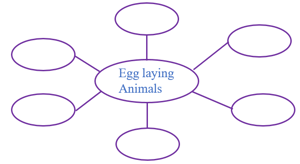Diversity and Classification in Animals
Diversity and Classification in Animals: Overview
This topic covers concepts such as egg-laying animals, classification of animals based on habitat, aquatic organism, classification of animals, and invertebrates animals.
Important Questions on Diversity and Classification in Animals
Animals that mostly stay in the _____ and fly in the sky are called aerial animals.
Vultures, albatrosses, flamingoes, pigeons and bats are arboreal animals.
Animals which fly in the sky are called aerial animals.
Animals that mostly stay in air are called _____.
The organisms that live in water are called terrestrial organisms whereas the organisms that live on land are called aquatic organisms.
Choose the aquatic organisms.
Frogs, toads, salamanders are examples of _____.
Classify organisms on the basis of their mode of reproduction.
Sarath says that the duck and the crocodile belong to the same group. Do you agree, why or why not?
Why is a hen called an oviparous?
Name some animals that lay eggs.
Find out which all animals give eggs and which all animals give birth to young ones in the given list below.
| S.No | Name of the animal which gives an egg | Name of the animals which given birth to young ones. |
| 1. | ||
| 2. | ||
| 3. | ||
| 4. | ||
| 5. |
Name the excretory organs in platyhelminthes.
_____ is the largest phylum of Invertebrates.
Name the phylum in which dorsal nerve tube, notochord and pharyngeal gill clefts are present.
Amphibians do not have the following:
Which among the following is exclusively marine?
Make a list of the creatures who lays eggs.
Fill the following mind-mapping.

Fill in the blanks with the help of suitable words:
(birth, feathers, nests, bring-up, Reptiles)
There are no _____ on chicks hatched from eggs.
